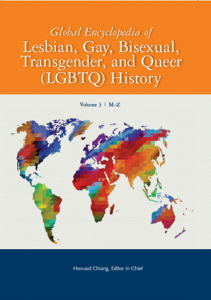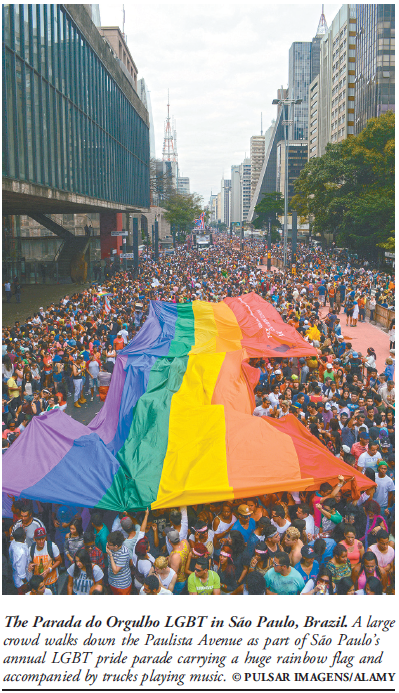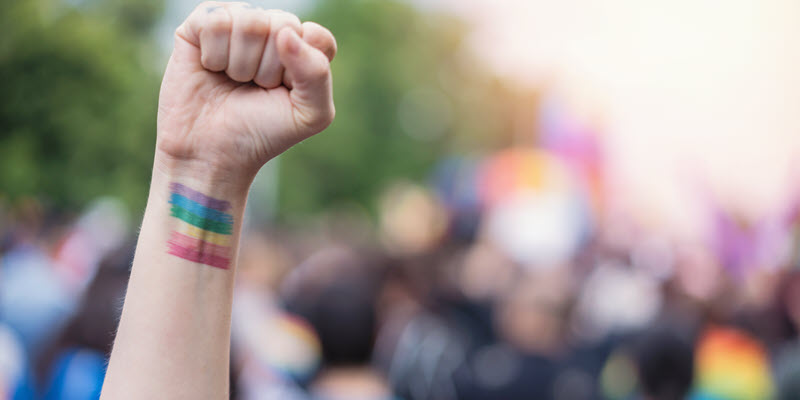| By Howard Chiang |
The Global Encyclopedia of Lesbian, Gay, Bisexual, Transgender, and Queer (LGBTQ) History is the product of two years of focused labor by hundreds of researchers and editors. The ambitious three-volume set, composed of nearly 450 commissioned articles and sidebars, reflects how the field of LGBTQ studies has engaged with social campaigns for equality, freedom, justice and liberation worldwide since the 1970s.
 That queer experience can be located across diverse regional, national and global contexts and at different points in time is perhaps the most ordinary feature of human existence. The editorial board was thus tasked with adding intellectual rigor, political color, cultural vibrancy and social relevance to this seemingly mundane observation. Initially conceived as a global companion to Scribner’s Encyclopedia of Lesbian, Gay, Bisexual, and Transgender History in America (2004), the Global Encyclopedia of LGBTQ History quickly became a different kind of intellectual pursuit. While interest in the historical experience of gender and sexual minorities remains the same, the question of how to translate that impetus into a reference guide meaningful on a planetary scale necessitated a rethinking of the key terms captured in the new title. In this rethinking, the conceptual polarity between rigidity and elasticity marks a recurring theme in the way that the editors maneuvered the interest of the different stakeholders for whom LGBTQ historical knowledge matters most.
That queer experience can be located across diverse regional, national and global contexts and at different points in time is perhaps the most ordinary feature of human existence. The editorial board was thus tasked with adding intellectual rigor, political color, cultural vibrancy and social relevance to this seemingly mundane observation. Initially conceived as a global companion to Scribner’s Encyclopedia of Lesbian, Gay, Bisexual, and Transgender History in America (2004), the Global Encyclopedia of LGBTQ History quickly became a different kind of intellectual pursuit. While interest in the historical experience of gender and sexual minorities remains the same, the question of how to translate that impetus into a reference guide meaningful on a planetary scale necessitated a rethinking of the key terms captured in the new title. In this rethinking, the conceptual polarity between rigidity and elasticity marks a recurring theme in the way that the editors maneuvered the interest of the different stakeholders for whom LGBTQ historical knowledge matters most.
To begin with, the concept of the global, like the concept of queer, contains a history of its own. A rigid view of the global might date its origin to a specific time period, typically referring to sometime in the post–World War II era (but some scholars go as far back as the fifteenth century if not earlier); a more flexible approach, on the other hand, might forego the task of temporal designation altogether and focus instead on the different ways globalization has manifested historically—sometimes in waves and cycles—across time and place. Similarly, some might cling to the stance that the transformation of “queer” from a derogatory term to a politically affirmative category is a relatively recent phenomenon (and thus not always applicable to the pre-Stonewall era or outside certain Western contexts). Others, on the contrary, might construe it as a flexible framework within which it is possible and heuristically valuable to grasp variations of social non-conformity—especially with respect to gender and sexuality—in both the past and the present.
The Global Encyclopedia of LGBTQ History also presents an opportunity to rethink the role that the very workings of encyclopedia and history play in our retrieval of information about the human past. Researchers and students tend to think of an encyclopedia as a comprehensive repertory of information on a given branch of knowledge. In this sense, like encyclopedia, historical narration is static, because it only captures, synthesizes, and presents materials that reflect the current limits of human interpretation. Yet it is also possible to approach encyclopedias, like history, as a malleable epistemic flash-point that draws attention to what remains unknown. If both encyclopedias and historical research satisfy the desire for human knowledge, LGBTQ studies has taught us—if nothing else—the importance of recognizing the unfamiliar and the otherwise. In this sense LGBTQ studies is as much a political project as an intellectual commitment; likewise, the Global Encyclopedia of LGBTQ History is as much a history about the future as an encyclopedia about what is yet to be known.
 By bridging global history and LGBTQ history, the Global Encyclopedia of LGBTQ History responds to an interesting paradox—a nuanced friction between these two fields of historical inquiry. Simply put, global history and LGBTQ history have by and large envisioned a very different kind of agenda respectively. So, when global historians diverged from world historians by stressing the importance of routes, avenues of circulation and exchange, and the connectivity between regions, peoples, materials and ideas, LGBTQ historians parted company with early feminist historians by foregrounding difference, diversity and multiplicity—ways of characterizing experience that cohere around social cleavages. It might be said that these parallel social and intellectual trends present notable obstacles for global history and LGBTQ history to bear on one another. The Global Encyclopedia of LGBTQ History, however, raises a number of possible strategies to overcome this deadlock.
By bridging global history and LGBTQ history, the Global Encyclopedia of LGBTQ History responds to an interesting paradox—a nuanced friction between these two fields of historical inquiry. Simply put, global history and LGBTQ history have by and large envisioned a very different kind of agenda respectively. So, when global historians diverged from world historians by stressing the importance of routes, avenues of circulation and exchange, and the connectivity between regions, peoples, materials and ideas, LGBTQ historians parted company with early feminist historians by foregrounding difference, diversity and multiplicity—ways of characterizing experience that cohere around social cleavages. It might be said that these parallel social and intellectual trends present notable obstacles for global history and LGBTQ history to bear on one another. The Global Encyclopedia of LGBTQ History, however, raises a number of possible strategies to overcome this deadlock.
First, by involving specialists of different world regions, the board aimed for an even geographical spread in developing the list of entries. Second, the board gave particular analytical breadth and depth to issues surrounding colonialism and imperialism. This emphasis in consideration is intended to reflect the centrality of these issues to the making of the modern world. Thirdly, while colonialism must constitute a sustained object of critical investigation in queer history, it also enables the board to raise important questions about how and why we are studying gender and sexual diversity—in colonial contexts or otherwise—especially for regions where LGBTQ topics have received less systematic examination. Last but not least, the board aimed for transnational coverage by thematizing the body and pleasure—analytical angles that are central but conceptually autonomous from LGBTQ concerns.
A closer look at LGBTQ experience reveals why distinctions such as that between “global” connections and “imperial” dominance—or the friction between global history and LGBTQ history for that matter—can and should never find a straight-forward solution in a concerted effort to challenge the status quo.
This blog is adapted from the “Introduction” of the Global Encyclopedia of Lesbian, Gay, Bisexual, Transgender, and Queer (LGBTQ) History.
For more information or to request a trial, visit the Global Encyclopedia of LGBTQ History webpage.
 Meet the Author
Meet the Author
Howard Chiang is assistant professor in the department of history at the University of California, Davis. His research focuses on modern Chinese history, the history of science and medicine, the history of gender and sexuality, global and transnational history, and Sinophone studies. He is the author of After Eunuchs: Science, Medicine, and the Transformation of Sex in Modern China (Columbia University Press, 2018) and Editor-in-Chief of the 3-volume Global Encyclopedia of Lesbian, Gay, Bisexual, Transgender, and Queer (LGBTQ) History, published by Gale in January 2019.

